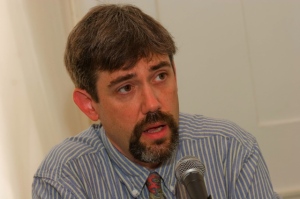
Dr. William Solecki, Director, CUNY Institute for Sustainable Cities, and Professor of Geography at Hunter College, will speak at the Rye Meeting House on Saturday, October 25, at 3 pm. A noted expert on climate and land use, his talk will focus on, “Climate Change and New York City: Lessons and Implications from Hurricane Sandy.” This is a rare opportunity to hear Dr. Solecki speak in Westchester.
Dr. Solecki has served on a number of U.S. National Research Council committees including the Special Committee on Problems in the Environment (SCOPE). He served as the co-leader of several climate-impact and land-use studies in the New York Metropolitan region.
This lecture is part of the Bird Homestead nonprofit’s ongoing series called, “After the Storm: Toward a More Resilient Shoreline.” The project is funded, in part, by a grant from the John E. Streb Fund for New York of the National Trust for Historic Preservation. The lecture series is inspired by the scientific endeavors of archeologist Junius Bird. He was “one of the first to carefully collect a broad range of data and materials on ecology and climate,” said archeologist Craig Morris in American Anthropologist.
Admission is free. Donations will be gratefully accepted. The Rye Meeting House is located at 624 Milton Road, across from the Dock Deli. For further information, contact 914-967-0099 or birdhomestead.meetinghouse@gmail.com with subject line Solecki. Photos by Hunter College.
